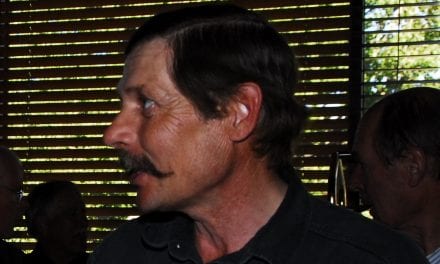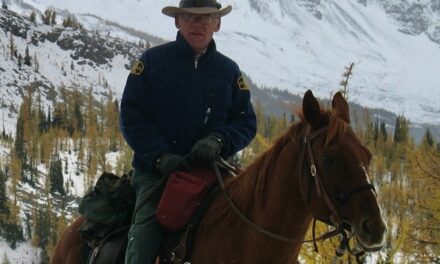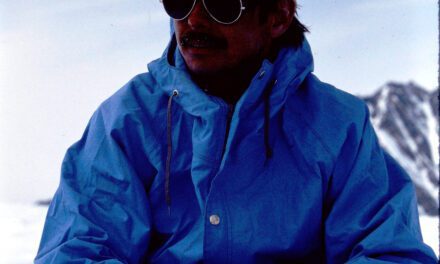Max – When that old original bridge was still there, it was barely existing, with poles about 6 inches thick, about five of them beside each other and it was getting pretty rickety. Sometimes when I worked at home, or near home, I would take Terry with me. This would allow Julie to go fishing. One day I had him with me as I worked at a little campground on the other side of the creek. Julie was baking bread that day and she came to cross the bridge to bring us a couple of cinnamon buns. She was smoking as she was coming across, balancing on that old bridge when one of the poles broke under her and she fell in. It wasn’t a fast flowing stream but it was deep enough that she sat, completely submerged, on the floor of the creek. When she came up and out she still had a cinnamon bun in each hand and the droopy cigarette was still in her mouth. We saw it all and Terry said, “Daddy, why did Mommy jump in the river?” Julie was really upset! So the next day the plan was started to build a new bridge.
Julie – At the time we didn’t think this was going to make a story but we have told it quite often.
Max – We had poaching experiences and various things happening but they are a dime a dozen. We think this backcountry experience is important.
Julie – There weren’t too many families that had young children in the backcountry. One time Max was away down the trail and I knew the day that he would come home. He would usually tell me when to expect him.
Max – I had to say, “Okay, today is the 5th of December, I will be home on the 15th,” and I usually made it so that for sure I could be back on the 15th. I would usually be home by the 14th.
Julie – There was no phone beyond the headquarters cabin so we had no contact until his return.
Max – So I would have to say this is how long it takes me.
Julie – The thing is if something happened to him the first day it would be maybe six or ten days before I would even raise the alarm. As I was saying, I expected Max that day and Terry was about two then. We walked down the trail, hoping to meet him. There was just light snow on his snowshoe trail. We walked as far as we wanted, didn’t see him, and then turned back. Later he came and saw our tracks where we had turned around. Then he heard this most God-awful scream from up ahead and he was sure it was me. Actually it was the scream of a cougar, but he ran all the way to the cabin expecting at any time to come upon us in distress. He burst in the door, all out of breath and I asked, “Well, what’s wrong?” He said, “You are HERE, I thought something had happened to you!” He went back there the next day and he found a cougar had killed an elk and dragged it across the trail. It was that cougar that had screamed but Max thought something tragic had happened. We were fine, no problem! There were lots of times like that when something awful could have happened but didn’t.
Julie – One time Terry had swallowed some aspirin. He had got into a bottle and I didn’t know how many he had eaten. Max was in town at the time. When I called the doctor in Jasper he said, “You’ve got to bring him in,” I said, “I can’t, I’d have to snowshoe 30 miles.” The wardens would have sent a helicopter but it was almost dark and it wouldn’t be able to land until morning. I asked the doctor, “What should I do?” and he said, “You should get the kid to throw up. But if he goes into a stupor or anything you should bring him in… but first get him to throw up.” So I made a mixture of a lot of things on hand, powdered eggs, vinegar, mustard, powdered milk, and I don’t know what all. I had a little dropper that was used to give him his vitamins and I used that to squirt him right full of that awful mixture. He threw up all right, all over the place and I was very relieved. The doctor had said, “Afterward, get him to drink milk.” I wrote in my journal that he drank 19 ounces of milk. Then we both went straight to bed. No problem. Sid Marty wrote this up in his book, “Men for the Mountains” and dramatized it so… about this phone line strung on the trees, connecting me to the doctor…and what was this poor mother going to do! Really it wasn’t an emergency. It could have been but it turned out that it wasn’t. We talked with Sid before he wrote his book and kind of laughed about it but he made it into a dramatic story. That’s okay, it’s his book, but a lot of people have said they had read the book and thought, “Oh, you brave woman!” They turned us into such blooming heroes and we weren’t, really. You just did what you had to do.
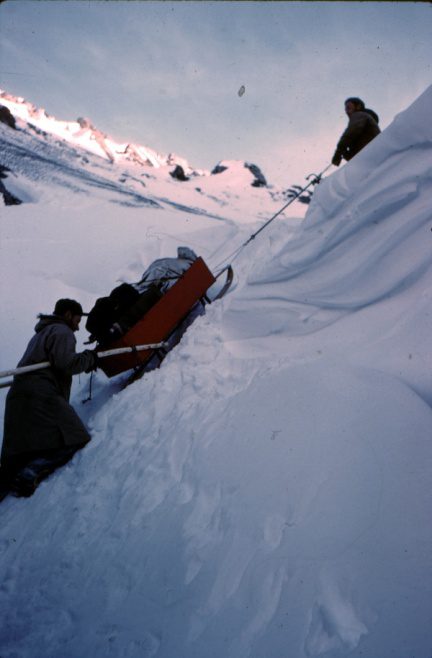
Julie – You talk with other warden’s wives about the experiences they’ve had and a lot of them were very helpful in giving advice about what foods you could take in and things like that. I had never in my life planned for the food needed for nine months! It had to be the staples, imperishable, and a little dull. For meats it had to be canned luncheon meat, canned chicken and ham. We vowed that we would never again eat Prem or Spork, and we haven’t. One could make a pretty good stew with canned corn beef and canned vegetables but we sure don’t have it any more.
Max – We promised ourselves that when we got out of the backcountry we would never eat those canned meats again. Then the selection of canned food was not like it is today. Today you can get different things. I remember they used to have a canned chicken, a big can, the whole bird! The bones in it were so soft you could actually eat them. But then they came out with the boneless chicken and everybody thought that was great. I remember our friend, Terry Gibbons, he was always experimenting with different foods. At that time the Nestle Quik came out with different flavours like banana, strawberry and so on. He was raving about how he had this new drink that was just like a milk shake with the real cold spring water! Because he was anxious to have sweets, when I was at his cabin he said, “I’m going to make a cake.” So he baked a cake and when it was finished he cut off a piece, ate it, and didn’t offer me one. He ate another bite and then he went to the heater that was burning full blast. He opened the lid and threw the whole thing in! I said, “You bastard, why did you do that? “Oh,”he said, “It was not very good.” But I would have eaten the dough if he had given it to me.
Julie – You had fresh eggs only until late October, and I said,” When I get out I am going to eat eggs that are scrambled, in omelettes, boiled or fried until I cackle!” When snowshoeing, Max didn’t bring in things like eggs. He would cut the bones out of pork chops to bring once in a while for a treat. But at the end of the month he had the chance to have an ice cream soda or a banana split.
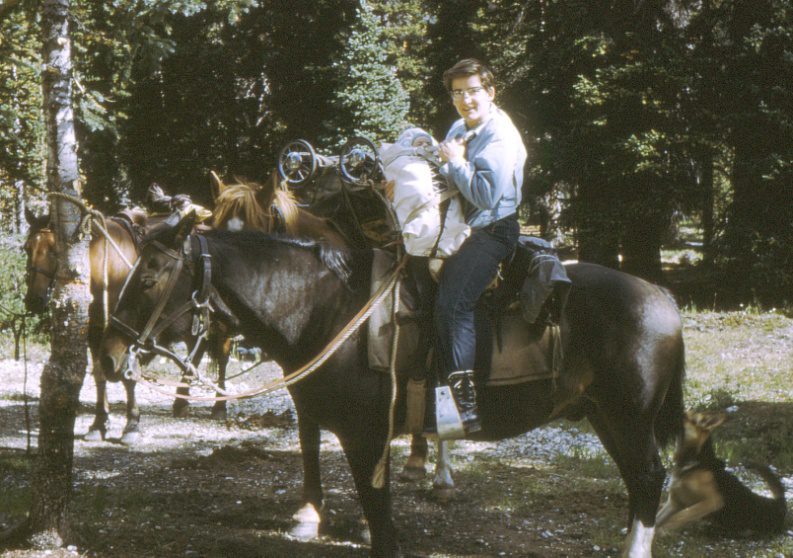
First trip over Nigel Pass
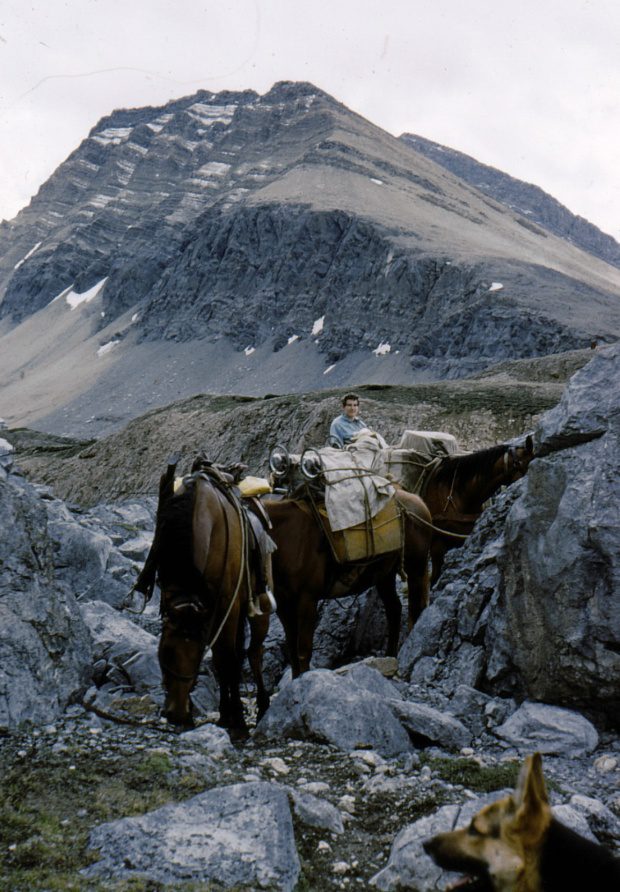
Max – The companionship and the friendship that is in the warden service is what made it unique. That still exists today. Part of it is having been on rescues, together, having worked together on poaching incidents or other law enforcement things. You also, over the years, got to know so many people that you’ve worked with, that you have met in a course or some darn thing, like getting to know your dad (Keith). While we never worked together, we saw each other in the nine or ten weeks I was over in Glacier. It gave you an appreciation which I don’t think many other people have, that is, working with people who have the same ideals and believe in the same solutions.
Julie – Not just that, you trusted your life to them on the rope. In mountain climbing you trusted them because you had to. Not many doctors or lawyers trust their co-workers in the same way.
Max – No, I don’t miss being a warden because I am realistic enough to say that I could not do as good a job today. But if you asked me, “Would you do the same thing again?”, I would say, “Yes!”
Julie – And I would say, “Yes, I will go with you.”
Max – We often say, when we reminisce, how fortunate we were to work actually in the three periods of the national parks warden service, the isolated district, the highway district and then in the centralization and area concept. All of them had good and not so good points. Like I used to say to some of my new wardens, and I had many seasonal,”If anything in one’s life is 51% good, it is good.” Now I say our life was 80 or 90% good and 10% lousy or bad. But the bad things make you stronger. I just don’t know of any work that I would have liked as much. I apprenticed as a precision mechanic, I worked as a steam engineer, a dishwasher, a landscape gardener, a miner, an aircraft instrument mechanic and a park warden, and more recently as a farmer. The warden service by far was the most satisfying, the most precious kind of life and work.
Julie – And speaking from the viewpoint of the woman, it was a shared thing, even to the point of having to have the bread baked before he left. You could believe in it, you could believe in the idealism of what the parks represented. I used to say, “I believe in what my husband does as much as if he were a minister of the Gospel. He is promoting what parks are all about.”
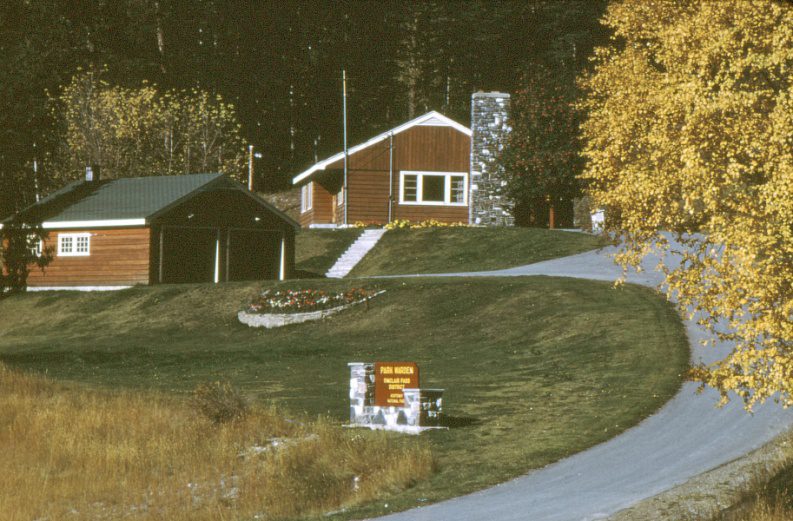
Sinclair Canyon, Kootenay
Max – Even in later life, when I was chief warden, Julie and I had an understanding. In Waterton in the wintertime restaurants were closed. Well, if there was a park’s person or a Canadian Wildlife person around, I knew, without calling Julie that I could ask them home for lunch because they were interesting people. I wouldn’t ask just anybody; I wouldn’t ask any bureaucrat just because he was working in the park, but if I felt that they were interesting people I could bring them home to meet Julie…and they were welcome. We enjoyed them and we have friends that we met in the parks over the years.
Max – We have one friend that we met when she was 18 or 19 years old. She was camping at the Jonas campground near Poboktan where we were stationed. I, and my co-worker Abe Loewen, talked with her and I invited her home for coffee. She stayed a week with us. She came back when we were in Kootenay with her two brothers. She also came with her husband. We visited them in their homes in both Wisconsin and South Carolina…and she is not the only one.
Another time we rescued a couple of guys who were stuck on a mountain. Dave Gilbride, Tom Volkers (Diane Volkers’ former husband) and I were involved in their rescue. It wasn’t a serious thing…but they were in a place where they could neither go up nor down. They were stuck there for many hours. For them it was bad but for us it was easy. We climbed up there, basically hiked up there, and with ropes brought them down. Well, they said that we had saved their lives. One of them is now a doctor in California. He even invited us to his wedding, paid our fare to Los Angeles, put us up in a hotel. We see him almost every year; he comes and we go hiking or skiing together. These are some of the things that have just happened time and time again. Most wardens have this kind of experience.
Max – Just this winter the daughter of one of our neighbours (a warden) when we were in Quebec, thirty years ago, has befriended Ursula and Terry. She wasn’t even born when we were there. She and her father came to visit us last summer. She is doing her doctorate in fisheries and technology. Living in Quebec was an entirely different thing.
Julie –As a warden’s wife you could talk with him about his work and often take part in it to a certain extent. This is more so than if he were a doctor, who comes home and says,” I had the most interesting case today.’ Or a plumber who says, “You should have seen my plumbing job today.” A warden and his wife could talk about what he was doing and they helped each other, at least in the old days. The family values the warden life promoted were invaluable.
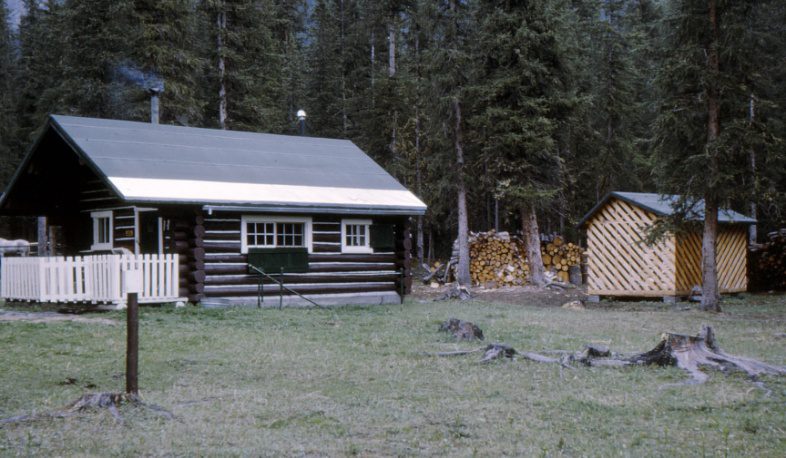
Jacques Lake cabin
Max – One time my horses were on the other side of the river and I tried to coax them across with a can of oats. They wouldn’t come and they wouldn’t come. I thought, “Well, I’d have to walk half a mile upstream to a foot bridge, then half a mile back here so I’m going to take my clothes off and swim across.” I did this but then couldn’t catch the horse I wanted, I could catch a pack horse but wanted my saddle horse. I tippy-toed through the bush quite naked when I remembered there was an outfitter’s campground right there and I didn’t know if anybody was there. Well, there was nobody there which was lucky. I used my pack horse to arrive, like Lady Godiva, on the other side and I put my clothes on. I thought to myself, “I can’t catch those horses.” I rode home bareback, saddled up, rode back and brought the horses home. If someone had been on the other side of the river that day they would have gone to Jasper and said, “I think you have a guy out there who you need to bring in.”
Julie – There is another story, (showing picture.) This was the old Brazeau cabin and the river was just over there, less than 100 yards from the cabin. It was winter when Max came home from town and when he came to the river he took off his pants, boots and socks and waded through the icy water. Instead of dressing he kept on coming to the warm cabin. Just then I glanced out the window and saw this man with no pants on, walking in the snow.
Max – I don’t know if anyone told you Jimmy Rimmer’s story of falling through the ice and freezing his toes off. He was at Indianhead at the time. Get someone in Banff to tell you, Johnny Wackerle could probably tell you. The rivers wouldn’t automatically freeze. It could be cold like it is now, or colder, and you would come to a river and you would either get all wet or, like I did, take off pants, boots and socks and wade across. Then you could put on dry clothes. I must have had tougher feet then because now I couldn’t walk five feet.
Max – Sometimes, with Terry Gibbons, if we travelled together we would pull straws to see who was going to carry the other guy across.
